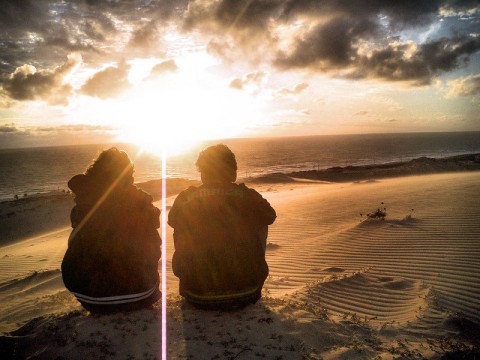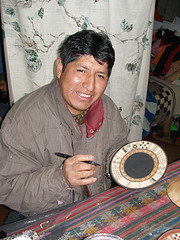How do you feel (About Art)?
How Do You Feel (About Art)? from svanes on Vimeo.
Leave a commentHow Do You Feel (About Art)? from svanes on Vimeo.
Leave a comment Photo By: Eletrificado
Photo By: Eletrificado
The following blog post was authored by Meg Campbell for the Huffington Post. Meg is among the 2009 Class of Barr Fellows. A remarkable educuator, Meg’s understanding of human connection in spaces of learning and transformation is consonant with our approach here at the Interaction Institute for Social Change. Read More
Leave a commentACE Assembly Trailer from ACE Space on Vimeo.
Leave a commentPaola Antonelli has appeared in various posts on this blog over the past couple of years as one of our favorite purveyors of design thinking and its application to social change. Now Antonelli is really stepping out. In an article for SEED Magazine, the senior curator of Design and Architecture at the Museum of Modern Art holds out a whole new and exciting realm of application for design – policymaking, governance, and social agendas. Read More
Leave a comment
My friends at the Engage Network recently asked me this provocative question:
What does it mean to create social change that is “human sized” and prioritizes people and relationships, rather than prioritizing large email lists, or campaigns, or raising money? What does that mean to you and YOUR work in the world?
Here is my first take at an answer: Read More
Leave a comment
“Everyone today has to be an artisan and bring something extra to their jobs.” This says Thomas Friedman in the New York Times. I’m not sure I like where he is coming from, it sounds a little bit like adding obscure features to a DVD player. But I do like the point. I like this idea of being artisans, of engaging our work as a craft, adding meaning to our tasks by putting our own signature on what we do.
Somewhere beyond Friedman’s capitalistic “do more,” in places outside the yupified fields of trendy taste, there is significant power to the work of an artisan. For example, the work of social change has become so professionalized that it is often disconnected from the depths of purpose that could unleash transformation. But by thinking of ourselves as artisans our own self-expression can actually serve connection, it can bring us closer to that place where hearts can meet.
Consider the purpose of your work, then think of what you do every day… how much more of yourself could you bring to this field where we toil? What’s your craft? What is it that you can create?
Leave a commentLots of anticipation around this year’s Web of Change! I am on the facilitation team as well as one of the hosts for the event. Hosts have been asked to launch this year’s conversation through a series of thought pieces that will be posted on webofchange.com every week until our convening begins. I have the honor of launching our “WOC Thought Bomb Series,” with the following reflections on “Paradigm Next and the Intersection.” Click here to read, and please do share your responses!
Leave a commentThe recent Shirley Sherrod debacle unfolds with a thousand lessons, among these are the very fact that whether we have a black President or not, the issue of race is alive and well in the United States. The incident also points to the potentially explosive concoction of new media technology and a 24hr “news” cycle, of the politics of spectacle and a culture of fear among our “leaders.” Even as technology is changing everything – our deepest wounds are yet to heal, and our suppressed demons continue to show their many heads.
This being said – I am an optimist! I trust the directionality of our current paradigm shift. Read More
Leave a comment
David Brooks is making me think again. This time he is pointing to the limits of policy. Yes, he’s throwing stones at what is a sacred cow for change makers of all stripes – and I’m glad he is doing it. As happens too often with Brooks, he gets dangerously close to cultural determinism, but it is by walking that line that he can manage to highlight some very important empirical patterns. Read More
Leave a comment
|Photo by TeresaM3Kids|http://www.flickr.com/photos/teresam525/3530463356/|

|Photo by Johan J.Ingles-Le Nobel|http://www.flickr.com/photos/43147325@N08/4370125469/|
I’m a big fan of Kevin Kelly. His latest blog post reflects on what he calls “Two Kinds of Generativity” and it has me thinking about the next phase of movement. Kelly describes the evolutionary process of an innovation. He speaks of the first stage as one that is “vague, incomplete and open to change.” This first stage is appealing to the early adapters, “tinkerers, nerds, fans, and hacks who will make it do all kinds of things no one had thought of.” Read More
5 CommentsFriends — I am asking you to help build my capacity to build our capacity to create the change we seek…. from the grassroots to the grasstops, and every village and hamlet in between. Last week, I received an invitation to participate in a meeting in a few weeks on the federal government’s nonprofit capacity building efforts — at the White House! Read More
Leave a comment